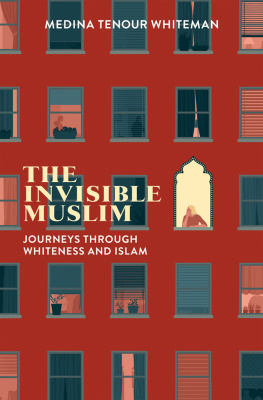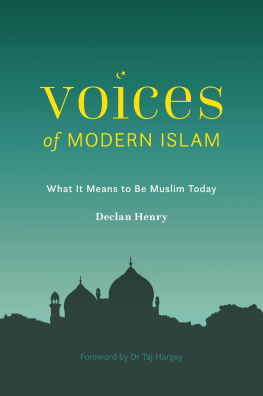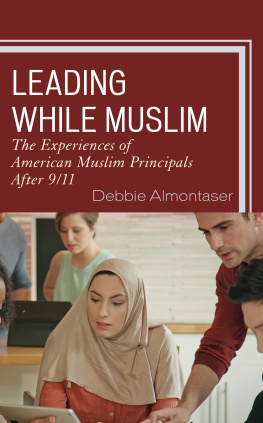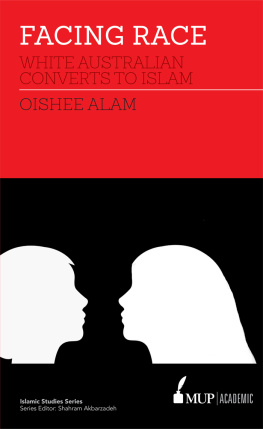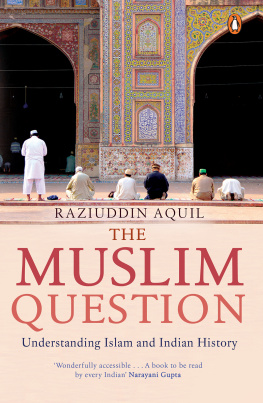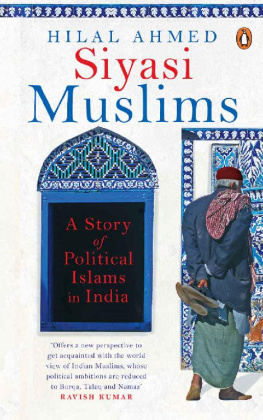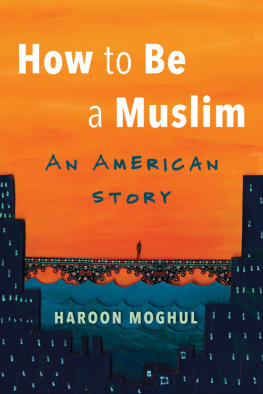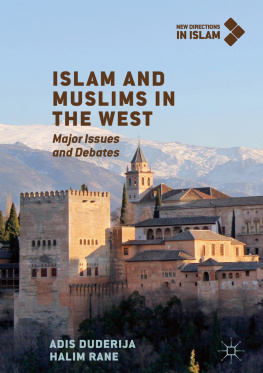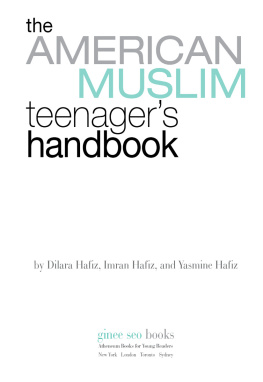THE INVISIBLE MUSLIM

MEDINA TENOUR WHITEMAN
The Invisible Muslim
Journeys Through Whiteness and Islam

HURST & COMPANY, LONDON
First published in the United Kingdom in 2020 by
C. Hurst & Co. (Publishers) Ltd.,
41 Great Russell Street, London, WC1B 3PL
Medina Tenour Whiteman, 2020
All rights reserved.
The right of Medina Tenour Whiteman to be identified as the author of this publication is asserted by her in accordance with the Copyright, Designs and Patents Act, 1988.
Cover and interior art by Alice Mollon.
A portion of Chapter 8, Love in a Lacuna, was previously published in Critical Muslim, Issue 10: Sects, edited by Ziauddin Sardar and Robin Yassin-Kassab, 2014.
A Cataloguing-in-Publication data record for this book is available from the British Library.
ISBN: 9781787383029
ISBN: 9781787384132 (e-book)
This book is printed using paper from registered sustainable and managed sources.
www.hurstpublishers.com
In memory of Clare Larmore (19242019),
Hajj Hossein Alkaei Behjat (19312018),
and Daniel Abdal-Hayy Moore (19402016):
The Earth is not bereft of Light.
CONTENTS
MY DEEPEST APPRECIATION goes to everyone who generously gave me their time, observations and support, letting me bounce ideas off them and shamelessly steal their anecdotes. In particular (but in no particular order): Sadaf Khan, Yasmeen Rasheed, Umar Atallah Khan, Javayriah Masood, Will Noor, Nora Fitzgerald, Hamza Weinman, Anna Preger, Shireen Cameron (thank you for taking me on the road trip of a lifetime in Bosnia!), Shakir and Radia Massoud, Abdal-Rahim Gulliver, Kamila Toby, Rahma Harrison, Veronica Polo, my sister Hanna Whiteman, Ali Rafi, Rebecca Lemaire, Deo Ravinder, Siddiqa Summers, Abu Qasim Spiker, Yamila Margarit, Fouad Dakhouch, Ahmedou Bamba Diawara and Zainab Montero, Rahma Blanco, Humera Khan and Fuad Nahdi, Hamida de la Rosa, Medina Trevathan, Yussra Nordenfeld, Sheila Ruiz, Francisco Martnez Dalmases, Yasmine Ahmed-Lea, Sophie El-Hajj, Firoz A. Osman, everyone at Rumis Cave, and many others who preferred to remain anonymous. Some names have been changed in the text.
I owe a huge debt of gratitude to everyone who so kindly hosted me while I was travelling, especially my Iranian family, who utterly redefined my idea of hospitality.
I would like to extend my thanks to Samia Rahman for suggesting this book and for continually encouraging me to push through my reluctance, and to my late poetry mentor Daniel Abdal-Hayy Moore and his family for nurturing my writing. Im grateful to Hurst for taking a chance on me and especially to my editor, Farhaana Arefin, for putting my manuscript through its paces.
Special thanks are due to my husband and children for their patience while I was writing this book, and to my parents, not only for countless lunches, babysits and bookshelf borrowings, but for placing me firmly on the fenceat times an uncomfortable place to sit, but one that has given me a better view.
Last, but far from least, alhamdulillah wa shukru lillah, wassalatu wassalam ala-nnabii. All praise is due to Allah, and all the errors are mine.
IM AFRAID I CANT let you into the United Kingdom if youve overstayed your visa in Spain. How do we know you wont overstay here?
For one long, hypnotic moment, I was standing in Stansted Airport, a few miles away from the village where I lived out my teenage years, my feet stuck to the ground with red tape.
I was holding my recently renewed American passport, minus the Indefinite Leave to Remain stamp that I had flippantly thought would be easy to recuperate. Right now, this passport felt like a foreign appendage or a phantom limb. It seemed I had been officially transformed into the outsider thatwith a touch of smugnessI always felt I was.
This was not, in fact, the first time I had been stopped at the British border. A year before, at Bristol Airport, taking two of my children to spend the summer with their father, I breezily mentioned that my ILR stamp had been lost when my passport was stolen and reissued in Spain, and that I would try to fix this apparent triviality during my stay in the UK.
The young, affable woman at the gate summoned a superior, far more curmudgeonly official, who told me bluntly that there was no record of the lifetime I had lived in the UK and that she had every right to demand I leave my children, then aged three and five, at the airport while she put me on the first plane to America. She must have seen my knees buckle, because I was given another chance to make my case. This time my defence that I was only visiting as a tourist was accepted, and I was allowed to enter the UK. I was now officially a sightseer in the country where I had grown up; the rug of home had been neatly pulled from under my hitherto blissfully unaware feet.
I had been living in Spain for six years by then, having moved there with the nave idea that a piffling thing like residency would be easily obtained. Ive learned enough about performing to be able to stride through airports with the breezy air of a Scandinavian on her way to any ordinary European destination, say, an annual reindeer hustling event. But Spanish immigration prohibits American nationals from spending more than three months at a time in Spain, and getting residency there as an American had a long list of absurd requirements, including proof of United States residency, social security and health insurance, as well as a doctors letter declaring you free from STDs, HIV, tuberculosis, yellow fever, typhoid, andI kid notthe plague.
Every time I entered Spain I would gird myself up with plenty of silent Quranic invocations to stave off the growing anxiety, but a combination of Spanish bureaucratic incompetence and the assumption that a white blonde woman couldnt possibly be an illegal immigrant meant that nobody ever checked the dates on my stamps. I dont typically wear hijab, especially not going through airport security. I looked like any other acceptably Caucasian tourist.
Technically, I could have been deported from Bristol to the US, a country Ive never lived in. I figured, on the one hand, that this was a test of faith; on the other, it was a reminder of the fact that an African, Arab, South American, or Asian woman would not be able to blag their way through border control as I so easily did. To non-EU nationals who have entered Spain without papers, or asylum seekers and refugees who have crossed bordersand even the Mediterranean Seato enter Europe, without a home to return to or any guarantee of surviving the crossing, its clear that our situations are worlds apart.
For a privileged person like me, having no official recognition of home might seem like a mere formality, but for many others it is visceral. It can make you dodge the public gaze, haunting quiet spots where you wont be seen or staying at home and reading the news. The white gleam of a police car sends a bolt of electricity through your nervous system. You need to work, so end up accepting poor conditions, meagre pay and zero healthcare in order to avoid raising red flags.
As a white American citizen, I had none of those horrors to deal with, but the experience gave me a tiny glimpse into the insufferable frustration brought about by one piece of paper, or its absence, rising in an unseen barbed-wire fence that separates humans from hospitals, police protection, and the freedom to work. Immigration paperwork is so dense with jargon and rules that often change faster than the bureaucrats knowledge of themnot to mention the lawyers billsthat you can easily feel youre caught in the centre of a nightmarish web that youll never escape from without a miracle.

